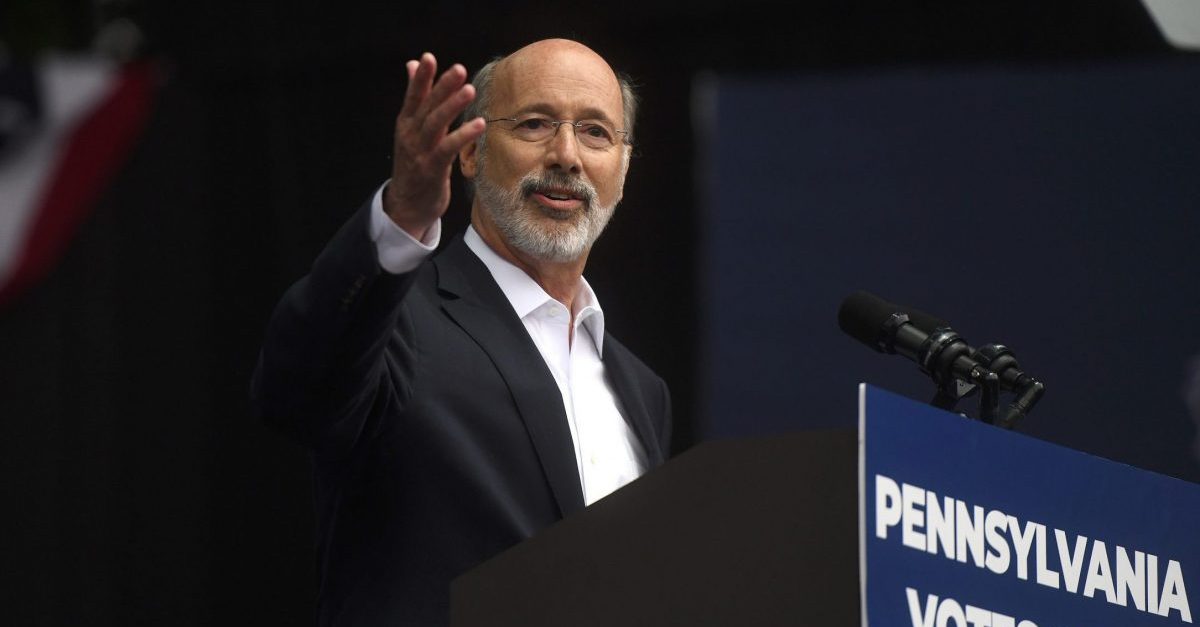
Tom Wolf
A federal judge handed several counties and Republican state lawmakers a major win on Monday when ruling that Pennsylvania Gov. Tom Wolf’s coronavirus shutdown executive orders had, indeed, run afoul of the Constitution.
Pennsylvanians have hit Wolf, a Democrat, with a number of lawsuits. The one we now discuss was filed in the U.S. District Court for the Western District of Pennsylvania. Judge William Stickman IV, a Trump-appointed constitutional stickler, found that Wolf meant well in attempting to respond to health risks posed by the novel coronavirus pandemic but nonetheless violated the First Amendment and Fourteenth Amendment rights of citizens.
“The COVID-19 pandemic has impacted every aspect of American life. Since the novel coronavirus emerged in late 2019, governments throughout the world have grappled with how they can intervene in a manner that is effective to protect their citizens from getting sick and, specifically, how they can protect their healthcare systems from being overwhelmed by an onslaught of cases, hindering their ability to treat patients suffering from COVID-19 or any other emergency condition,” Stickman began. “In this country, founded on on a tradition of liberty enshrined in our Constitution, governments, governors, and courts have grappled with how to balance the legitimate authority of public officials in a health emergency with the Constitutional rights of citizens.”
In Stickman’s view, Wolf failed to strike that balance when it came to restrictions on gatherings and the closure of “non-life-sustaining” businesses—an ill-defined variation of essential vs. non-essential businesses. In fact, the judge said that the record showed not even Wolf and his team knew what the life-sustaining vs. non-life-sustaining dichotomy meant because they didn’t define it.
“After reviewing the record in this case, including numerous exhibits and witness testimony, the Court believes that Defendants undertook their actions in a well-intentioned effort to protect Pennsylvanians from the virus. However, good intentions toward a laudable end are not alone enough to uphold governmental action against a constitutional challenge,” Stickman noted. “Indeed, the greatest threats to our system of constitutional liberties may arise when the ends are laudable, and the intent is good—especially in a time of emergency.”
Stickman declared that Wolf violated the First Amendment with his order imposing limits on indoor and outdoor gatherings; violated the Due Process Clause and Equal Protection Clause of the Fourteenth Amendment by ordering “non-life sustaining” businesses to shut down.
On the business closure front, Stickman noted that small businesses were shut down simply because they were small businesses, while Walmart, Lowes and Home Depot—”big box retailers”—were allowed to remain open.
Considering that the state didn’t even define life-sustaining and non-life-sustaining, Stickman said the order could not stand. And the judge noted that this undefined distinction between businesses, ostensibly with the purpose of limiting human interactions amid a pandemic, actually had the unintended consequence of funneling widespread demand into a “big box retailer” location:
Refusing to allow the Salon Plaintiffs to sell shampoo or hairbrushes did not eliminate the demand for those product, it just sent the consumer to Walgreens or Target. In fact, while attempting to limit interactions, the arbitrary method of distinction used by Defendants almost universally favored businesses which offered more, rather than fewer products. As such, the largest retailers remained open to attract large crowds, while smaller specialty retailers—like some of the Business Plaintiffs here—were required to close. The distinctions were arbitrary in origin and application. They do not rationally relate to Defendants’ own state goal. They violate the Equal Protection Clause of the Fourteenth Amendment.
Stickman concluded by saying one does not simply erode foundational freedoms in times of emergency.
“The Court closes this Opinion as it began, by recognizing that Defendants’ actions at issue here were undertaken with the good intention of addressing a public health emergency. But even in an emergency, the authority of government is not unfettered. The liberties protected by the Constitution are not fair-weather freedoms— in place when times are good but able to be cast aside in times of trouble,” the judge wrote. “There is no question that this Country has faced, and will face, emergencies of every sort. But the solution to a national crisis can never be permitted to supersede the commitment to individual liberty that stands as the foundations of the American experiment.”
“The Constitution cannot accept the contempt of a ‘new normal’ where the basic liberties of the people can be subordinated to open-ended emergency mitigation members,” he added, declaring Wolf’s order unconstitutional.
Wolf’s office immediately said they would seek a stay of the ruling pending the outcome of an appeal. The ruling was celebrated by Pennsylvania Republican lawmakers and conservative media figures.
Tom King, an attorney for the plaintiffs, said the order from Stickman was straightforward, as were the aims of the plaintiffs. He represented U.S. Rep. Mike Kelly (R-Pa.) and Republican state Reps. Daryl Metcalfe, Tim Bonner, and Marci Mustello in the lawsuit. King also represented Butler County, Fayette County, Greene County and Washington County.
“We didn’t seek a dollars worth of damages, we sought a declaration that these things were wrong and that’s exactly what Judge Stickman’s order finds. The state was wrong,” King said.
Read the lawsuit below:
Judge says Tom Wolf’s orders unconstitutional by Law&Crime on Scribd
[Images via YouTube screengrab, Mark Makela/Getty Images]